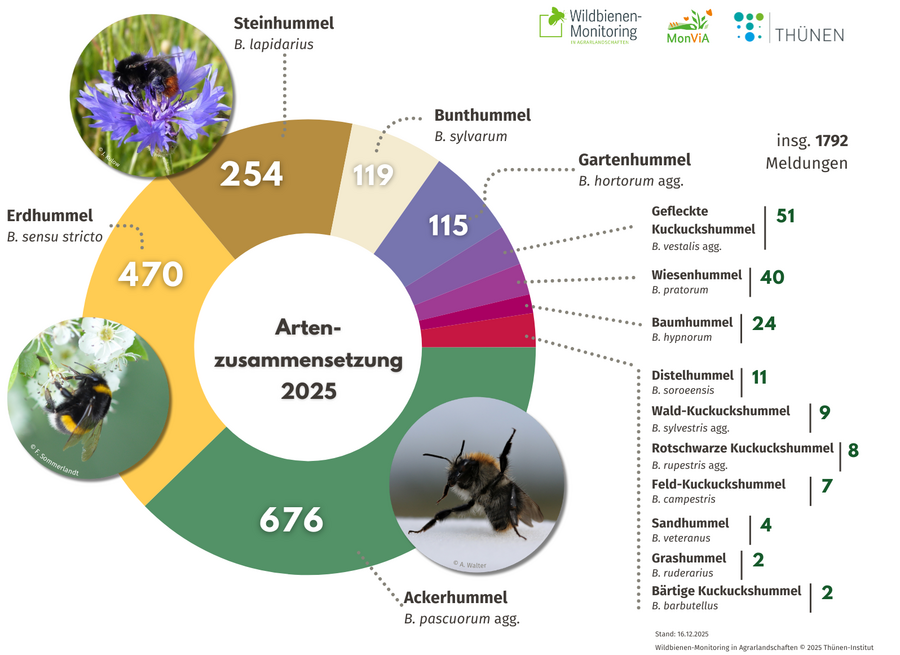
Further increase in the number of surveyed transects
The bumblebee monitoring began in 2021 with a small number of pilot sites and has seen a steady annual increase since 2022 in both volunteer participation and the number of transects monitored. In the 2025 season, around 130 volunteers across Germany surveyed 76 transects. In total, 460 transect surveys were conducted, during which 15 different bumblebee species and species-groups were recorded. On average, 18 individual bumblebees from three to four different species were detected per transect over the course of the year, which is broadly in line with results from previous years. An update of the Thünen Institute’s wild bee indicators will be published soon on the MonViA website. However, due to the still short time series, no long-term trends can yet be identified.
Bumblebees from 15 species groups were recorded
In 2025, the most frequently recorded species by far were Common carder bumblebee (Bombus pascuorum), accounting for more than one third of all observations. They were followed by the complex of Buff-tailed and White-tailed bumblebees (B. sensu stricto) and Red-tailed bumblebees (B. lapidarius). Together, the three most common species or species groups accounted for more than 75% of all records.The fourth most frequently recorded species was the Shrill carder bumblebee, which is classified on the German Red List as a “near threatened” species (early warning list). This species has also ranked among the top five most frequently recorded species in the Bumblebee Monitoring in recent years, suggesting that it copes comparatively well with agricultural landscapes. In addition, two species listed as threatened or endangered on the German Red List were again recorded this year: the Red-shanked carder bumblebee (B. ruderarius) and the Sand-coloured carder bumblebee (B. veteranus).
More than 260 different interactions between bumblebee species and (wild) plants were observed
The availability of forage plants and suitable nesting habitats are key factors determining the occurrence of bumblebees. For this reason, in the Bumblebee Monitoring not only bumblebee species are recorded but also data on flowering plants visited by the bees. In the 2025 season, more than 1,460 different plants were recorded, representing a total of 89 different plant genera. In total, more than 260 different combinations of interactions between bumblebee species and (wild) plants were observed. The most attractive plants belonged to the mint family (Lamiaceae), legumes (Fabaceae), daisy family (Asteraceae), rose family (Rosaceae), and borage family (Boraginaceae).
Backgroundinfo
Since 2022, the Thünen Institute has been conducting the wild bee monitoring in agricultural landscapes, collecting standardized data on key pollinators across 14 of Germany’s 16 federal states. A separate monitoring program focuses on bumblebees.
Bumblebees are of great ecological and economic importance due to their highly effective pollination of numerous wild and cultivated plants. At the same time, their populations are under pressure worldwide as environmental conditions continue to change. Through the Bumblebee Monitoring in Agricultural Landscapes, the Thünen Institute—supported by many volunteers—collects important nationwide data on the distribution and abundance of this key pollinator group. Volunteers survey fixed 500-metre routes (transects) once a month from March to October. During these surveys, bumblebees are captured, photographed, documented, and then released. The resulting time series allow to document population trends over longer periods and help identify key drivers within agricultural landscapes.
Further information on the Bumblebee Monitoring in Agricultural Landscapes – including results from previous years and details on how to participate - can be found on the project website: https://wildbienen.thuenen.de/.
Contakt: Dr. Frank Sommerlandt (frank.sommerlandt(at)thuenen(dot)de)